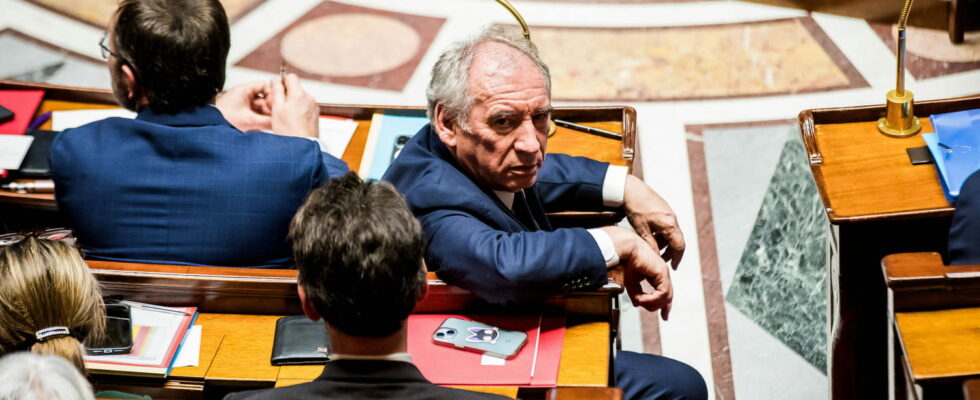With the examination of the 2025 budget in the National Assembly, the risk of a motion of censorship is becoming clearer for the government. The votes of the PS and the RN promise to be decisive, but no party has promised to support François Bayrou.
The victory of the Bayrou government over its first censorship is already only a distant memory. The Prime Minister is preparing to face a new reversal attempt while the bill concerning the 2025 budget arrives in joint joint committee (CMP) this Thursday, January 30. In the event of agreement, the CMP conclusions will be read and voted in the National Assembly on Monday, February 3.
No censure motion deposit was confirmed, but part of the left regularly evokes this option. If such a text is actually deposited, it will have to be voted 48 hours later, on Wednesday February 5 at the earliest. A week of a possible new test to overthrow the government, what are François Bayrou’s chances to stay in Matignon? If during the first censorship he had been able to count on the support of the National Rally (RN) and the Socialist Party (PS), the Prime Minister has since crumpled some of these opposition forces.
The PS ready to resume negotiations … as to censor?
The PS, which stood out from the rest of the new Popular Front (NFP) by not voting censorship, continued its momentum And continued negotiations with the executive on the budget to ensure as many guarantees as possible. If the exchanges were going well, they were interrupted net on Tuesday January 28, after the releases of François Bayrou on … immigration. “Sawmly borrowing” from the vocabulary of the extreme right, according to the analysis of the head of the socialist deputies Boris Vallaud, the Prime Minister alerted to the “submersion” migrated during an interview on Lci January 27. A repeated warning the next day in the National Assembly when PS elected officials left him a chance to come back to his words.
With these declarations, François Bayrou breaks the “prerequisite” to discussions with the PS on common commitment aimed at “never depending on the RN”, explained a socialist to Politico. The party has since specified its conditions to resume negotiations: the withdrawal of the words of the head of government and the promise of not touching on state medical aid (AME). Other subjects would also be in the balance as an “an increase in immediate minimum wage” or an “increase in the activity bonus” according to the deputy Philippe Brun.
As for the possibility of voting censorship, the PS has not clarified its position since the Prime Minister’s right -handed exit. Already mixed during the first censorship – 8 elected officials had supported the motion against the general position of the party -, the socialist deputies could this time be numerous to want to overthrow the government.
The RN maintains the blur
The threat of censorship by the PS is not, however, that which worries the Prime Minister the most and those for an arithmetic reason: if the whole NFP supports censorship, this only represents 192 votes out of the 289 necessary for achieve the text. The parts of the common base – the presidential camp, the right and the Liot group – should not support censorship, it is therefore on the RN and its ciotist allies that the success or the failure of censorship rests (still).
With its 124 elected officials and 16 allies of the Union of Laws for the Republic (UDR), the RN can overthrow the government if it adds its votes to those of the NFP: the absolute majority would then be widely exceeded with 332 votes. Knowing this, would François Bayrou try to ensure his rear by sticking to certain measures or ideas of the extreme right, especially on immigration? It is the analysis of a former macronist minister who considers to 20 minutes that the Prime Minister “now considers that the dynamics of censorship are more in the far right than to left”. But by opting for this strategy, François Bayrou risks making “the same error as Michel Barnier” censored despite concessions to the far right.
The RN has not yet asserted its desire to overthrow the government, despite recurring warnings, notably on immigration. To give up a removal or at least a reduction in the soul as requested by the PS, could thus be a reason for censorship. The president of the party Jordan Bardella considered a new dissolution “inevitable” next summer during his wishes to the press, but he did not decide the question of censorship. However, he castigated “the facade of soft consensus” embodied according to him by the Prime Minister.
Bayrou censored with a few voices?
Matignon has every interest in being prudent and in choosing the right one he wants to negotiate. If the elected officials RN are more numerous, they have proven their capacity to surprise at the expense of the previous government. We must not forget either another arithmetic observation: even in the event of support of the RN, its allies and the NFP to a motion of censorship, in the absence of the 66 socialist votes the absolute majority cannot be reached and the government cannot be overturned. However, this implies having the assurance of being supported by the PS in full or almost.
A deputy for the presidential camp underlines this important detail and warns against the “risk of censorship by accident” by ignoring the PS requests too much. It is enough that 23 socialist elected officials vote the motion of censorship with the RN, its UDR allies and the NFP to push the Bayrou government outside. And this, not to mention any votes from the presidential camp, from the Liot group more independent than the rest of the common base or non-inscribed. Knowing that during the first motion of censorship, half of the PS was ready to vote it, the 23 votes account could quickly be reached.
